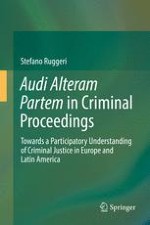2017 | OriginalPaper | Buchkapitel
10. Harmonisation of Criminal Justice and Participatory Rights in Criminal Proceedings. New Developments in EU Law After the Lisbon Treaty
verfasst von : Stefano Ruggeri
Erschienen in: Audi Alteram Partem in Criminal Proceedings
Aktivieren Sie unsere intelligente Suche, um passende Fachinhalte oder Patente zu finden.
Wählen Sie Textabschnitte aus um mit Künstlicher Intelligenz passenden Patente zu finden. powered by
Markieren Sie Textabschnitte, um KI-gestützt weitere passende Inhalte zu finden. powered by
